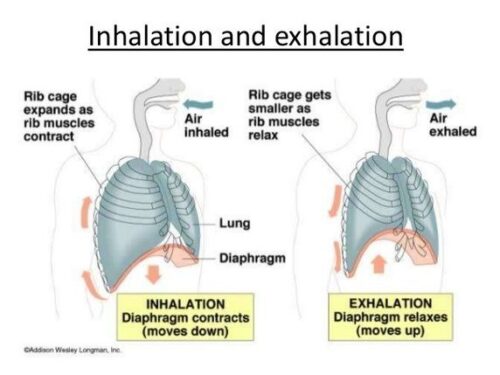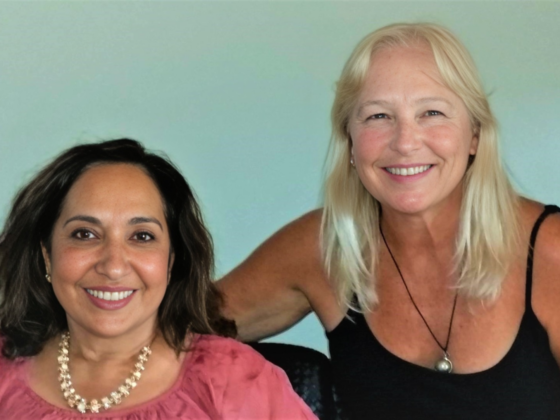I admit that I’m completely embarrassed about my snoring and sleep apnea (of course, there is no reason to feel this way), and I’m always looking for tips to improve my breathing, thus my sleep, thus my life!
Recently I was chatting with a colleague who had some insights about sleep and breathing that I just HAD to share with you.

Meet Lorraine Clifford, who is a breathing educator, holistic nutritionist, and Reiki master.
Read on for a snapshot of our conversation about how your breathing impacts sleep, snoring, and apnea.
People have the most fascinating experiences that lead them to help others improve their health. What led you to this work?
Shortly after my Mom passed away from cancer at the age of 57, I was diagnosed with cancer myself, at age 36. That led to 14 years of medical protocols, chemotherapy, ICU, radiation, and reconstructive surgeries. Seventy-five percent of people who have sarcoma do not survive five years, but my children were young, and I still had so much to do and experience!
I am a person who likes to know why, so I asked a lot of questions and did my own research. I began to understand who I was and how I operated. I started taking control by supplementing my diet with quality nutraceuticals, shopping local and organic, and removing all toxins from our home.
I had worked for many years for an orthodontic specialist who focused not on extracting teeth but expanding jaws, which results in a larger, healthier airway. This led me to an awareness of Buteyko breathing, which improves body oxygenation, releases more energy, and supports lifelong health and well-being. (Learn more about Buteyko breathing here).
Our bodies are created miraculously with the ability to heal when given the raw materials we need. Knowing what I know now — our health all starts with our breathing!
Why is it important that people understand more about breathing and how it impacts sleep?
We can survive a short time without food and water, but without breathing — only a few minutes. We breathe about 20,000–30,000 times a day, so breathing incorrectly changes the health of every cell in your body. How you breathe habitually during the day will be how your body knows how to breathe during sleep. Modern day stressors have caused most of us to overbreathe, and then we carry this into our sleep hours.
What is “overbreathing”?
Overbreathing is breathing too quickly, too deeply, or irregularly. This is a habit, usually resulting from long-term stress where healthy breathing patterns don’t have an opportunity to recover and normalise. And because overbreathing is a habit, you can change it!

There are three aspects of your breathing that can be unhealthy.
- A healthy breathing rate is 8–12 breaths per minute. Most people breathe closer to 20 breaths per minute.
- A healthy volume of air is 4–6 litres/minute or 400- 500 ml for each breath. Some of us breathe too shallowly, or mouth breathe too much air.
- Your breathing pattern should be regular and consistent, from deep in the lungs at the diaphragm. Is your breath steady, relaxed, slow, calm, and silent, or is it audible, quick, erratic, and jagged?
Overbreathing causes two major shifts in our body.
- It triggers the sympathetic nervous system into a constant low-grade fight-or-flight mode of increased breathing rate (hyperventilation), blood pressure, heart rate, and adrenaline. This serves us well when we are in immediate danger and have the need for quick, focused action, but it’s very harmful during our sleep time.
- Overbreathing diminishes the carbon dioxide in our blood. A small amount of carbon dioxide needs to be retained in the body for metabolic activity and regulation of respiration. If our levels are too low, blood pH rises, and fatigue, headache and other symptoms are the result.
How does breathing affect our sleep?
If you are overbreathing during the night, you don’t spend enough time in the calm, rest and repair state of the parasympathetic nervous system. Your sleep is restless and uneasy, and you awaken feeling tired and unrefreshed.
Typically, doctors do not equate breathing habits with quality of sleep. Many people with sleep issues get prescribed sleeping pills, which do not address the root of the problem. Light, calm breathing may diminish both snoring and sleep apnea, and lead to a deeper and better quality sleep.
I receive many questions about snoring. Tell us more about that.
There is a direct link between mouth breathing, overbreathing, and snoring, all of which draw too much air into the lungs, leading to dryness, narrowing, and inflammation of the airways.
Your mouth was made for eating and speaking — not for breathing.
Your mouth is much larger than your nostrils, and you will inhale far too much air with mouth breathing. This actually contributes to further nasal congestion, so the cycle continues. Also, your mouth can’t filter air properly, so pollution and bacteria get directly introduced into your lungs leading to unnecessary mucus production that may restrict breathing and lead to more infections, colds and flu. And, because your mouth is not designed to change air temperature (your nose can), air that is either too cold or too hot may shock the lungs into an inflammatory response.
Many factors can contribute to mouth breathing, such as colds, allergies, or asthma. The relaxing effect of alcohol on your throat tissues can make you overbreathe. If you sleep on your back you will be more prone to snoring, as the tongue and soft palate sag with gravity in the deeper stages of sleep. And being overweight can narrow your airways.
Developing a daily practice and habit of nose breathing will translate into nose breathing during the night, and can help diminish snoring.
How does improving our breathing help with sleep apnea?
First, overbreathing during sleep triggers your respiratory center that it is not getting enough oxygen to the tissues, so it struggles to bring things back to normal. It shuts down your breathing with an apnea in order to capture more carbon dioxide, and rebalance oxygen delivery. Then, as you begin your habitual overbreathing again, the cycle continues over and over.
Second, because overbreathing draws too much air into the lungs, it creates a negative pressure that can cause the upper airway to collapse inward, and you may experience an apnea.
How can improving our breathing help with insomnia?
Insomnia is rooted in long-term stress, anxiety, depression, reaction to physical or emotional trauma, or an overactive mind. Everyone can relate to the frustration of thoughts which refuse to switch off, sometimes all night.
Practising Buteyko breathing helps quiet your mind and allows your body to relax. Attention to your breathing takes attention away from other troublesome thoughts; and when you reduce your breathing volume, your body is able to activate the calm parasympathetic relaxation response.
How does breathing relate to healthy eating and a healthy weight?
Overbreathing is stressful on your entire body, and stress is known to cause some of us to comfort ourselves with food. But when your sympathetic nervous system is activated by overbreathing, one result is that you produce less saliva, which interferes with digestion. If food is not broken down and metabolized properly, it may cause inflammation through intolerances, sensitivities or allergies.
The opposite effect is also true. When you are not continually overbreathing, the gentle parasympathetic response allows better digestion, assimilation and utilization of what you eat. This in turn can help you cope better with day-to-day stresses, and you may feel more nourished on less food.
Plus, sleep-deprived people may find that they tend to eat more because of the leptin/grehlin hormone imbalance caused by the lack of sleep. As you improve your breathing, you will get a better quality sleep as your body enters readily into the rest and repair mode, where the delicate hormones of your body can be balanced and maintained.
This is fascinating. Let’s help people start to improve today. What advice do you have to help resolve mouth breathing and overbreathing?
First of all, know that sleep issues are an indication that you have a problem with your breathing.
Be mindful to breathe through your nose with gentle, rhythmic, quiet, diaphragmatic breathing, with no upper chest movement.
Ask yourself:
- Are you sitting and standing tall? Poor posture constricts the diaphragm.
- What is your head position? Some people with a forward head position (such as when driving or at your computer) will tend to breathe more through their mouth.
- What is your sleeping position? The best position for easy breathing is on your side.
To stop mouth breathing – just be aware, and notice if you are breathing through your mouth. Practice, practice, and practice. You can tape your mouth closed during sleep. To clear your nose, use a netty pot or saline solution to rinse your nostrils. Allergy IgG testing may identify any sensitivities and intolerances. There are also some effective nose clearing exercises you can do (see this video).
You have everything you need to change your breathing and feel better. It’s under your control. You can override your autonomic breathing patterns with some conscious attention. Retraining your daytime breathing will spill over to healthy breathing during the night.
Remember, your breathing affects every cell, every moment, and it has great power to help you heal. Your body will respond quickly as you improve your breathing habits.
Lorraine, how can we learn more about this?
I encourage you to contact me directly, at 403–238–7457 (home office), 403–605–9216 (cell), email myfrequensea@shaw.ca, or my website www.breathway.com.
Lorraine, thank you so much for sharing your expertise. I now focus on breathing through my nose, even during tennis and activity, and I am now more aware when I am not breathing calmly from my diaphragm. I notice that when I slow down my breathing before it becomes erratic, I actually have MORE energy and more mental clarity. All of us need more of that!









